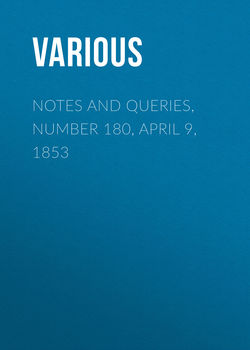Читать книгу Notes and Queries, Number 180, April 9, 1853 - Various - Страница 5
Notes
GAFFER OR GAMMER, ETC
ОглавлениеThese two venerable words were used by our ancestors. Every one has heard of Gammer Gurton; Gaffer Gingerbread was also famous in, as well as I can remember, a portion of the literature which amused my childhood. In Joseph Andrews, Fielding styles the father of Pamela "Gaffer Andrews:" and, for aught I know, the word may be still in use in Wilts and Somerset.
Unde derivantur Gaffer and Gammer? Lye said they were quasi good-father and good-mother; Somner, that they were the Anglo-Saxon Gefæder and Gemeder, i. e. godfather and godmother; Webster derives the former from the Hebrew geber, man, the latter from the Scandinavian gamel, old. Having a fondness for simplicity, I go less learnedly to work. I have observed little children, when commencing to speak, to say "ganpa" and "gamma" for grandpapa and grandmamma: whence I conjecture that, in the olden time, ere we had Pa's and Ma's, the little aspirants used to say "ganfa'er" and "gamma'er," which easily became Gaffer and Gammer. I am confirmed in this view by a friend to whom I mentioned it, and who told me that his own children always called his father gaffer, a word entirely of their own formation.
There is a term now coming a little into use, which is I believe of pure Irish origin, namely, old fogie. Indeed, I have heard it used rather disrespectfully of those mature old warriors, whom it pleases the wisdom of our government to send out in the command of our fleets and armies. The word, as I said, is of Irish, or rather of Dublin birth. The old fogies are the inmates of the Royal or Old Men's Hospital, the Irish Chelsea. I think, then, that it must be plain to every one that the term is nothing more than a good-humoured corruption or diminutive of old folks.
This leads me to the simple origin of a word which seems to have posed all our etymologists—it has done so to Richardson at least—namely, "Pettifogger, a low, tricky attorney." According to my view, pettifogger is neither more nor less than pettifolker, i. e. one whose practice lies among the petty folk, small tradesmen, day-labourers, and such like. This derivation, too, has simplicity in its favour.
Thos. Keightley.
